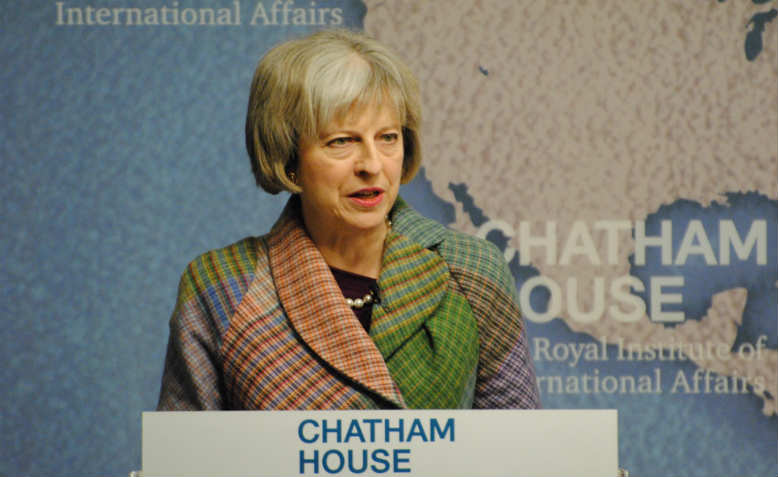 Theresa May as Home Secretary, 2015. Photo: Wikimedia Commons
Theresa May as Home Secretary, 2015. Photo: Wikimedia Commons
Theresa May’s attempt to look strong and stable in response to the tragedy on Saturday night has failed argues Chris Nineham
Saturday night’s appalling atrocity in London once again raises urgent questions about how to deal with the threat of terrorism. Once again much of the mainstream discussion has been unenlightening. Most commentary studiously avoids the central question of the links between terrorism and the wars that the West has been fighting over the last sixteen years. Yet there is a vast body of evidence, backed up by a series of experts and insiders from the former of MI6 head Eliza-Mannigham Buller to Dr David Wearing, at SOAS at the University of London, that the West’s wars have been one of the main drivers of the spread of terrorism.
Despite the generally low level of debate, Theresa May’s attempts to respond to the terrible events in London simply by blaming ‘too much tolerance’ and calling for a series of repressive measures have fallen flat. At the press conference after her speech this morning she faced a grilling over her refusal to reverse to the massive police cuts that happened on her watch. Then she was cross questioned about her refusal to criticise Donald Trump’s tweeted attack on London Mayor Sadiq Khan.
One obvious weakness in May’s time-to-get-tough approach is that she was Home Secretary during a period when the emergency service budgets were slashed. Embarrassingly for her, it has emerged too that May voted against a number of anti-terror measures along with Jeremy Corbyn, including control orders and fourteen day detention.
But there are other more important factors in play here. The popular mood after both the Manchester and the London attacks was for unity. There is a growing understanding that the terrorists want to create hatred and division in British society. May used a very different, divisive language in her Sunday morning speech and it is obvious to many that the kind of draconian measures she proposed can only increase tension and risk playing into the terrorists’ hands.
What is more, calls for an increase in surveillance and demands that the Muslim community get serious about the terrorist threat look frankly ridiculous when in both cases it appears that the security services were well aware of the perpetrators, partly because they had been reported by – guess who - members of the Muslim community.
Another issue is that after the Manchester bombing, polls showed that the majority of British people do think there is a link between an aggressive foreign policy and the spread of terrorism. It is not just that May refuses to recognise this, but she is clearly committed to ramping up foreign interventions. Her campaign team have indicated she will order attacks on Assad in the more and more unlikely event that she gets a big majority. A poll taken in May shows that levels of disapproval of foreign wars is at all-time highs. It shows not just strong opposition to the 2003 invasion of Iraq, Afghanistan and the attack on Libya, but even opposition to the first Gulf War in 1991.
Even more seriously, Theresa May has shown unswerving support for Donald Trump whose foreign policy is widely regarded as being dangerous, if not deranged. The Trump turn includes of course a highly public tightening of relations with Saudi Arabia and an end to all criticism of what is laughingly called their poor human rights record. Another awkward issue is that, as Jeremy Corbyn has pointed out, Saudi has been a prime supplier of the ideas and the arms that have fuelled terrorism over the last two decades. As even Hilary Clinton admitted back in 2013, Saudi has “exported more extreme ideology than any other place on Earth over the course of the last 30 years”.
Just as important, Trump’s vision of a Muslim NATO centred on Saudi Arabia which he promoted on his recent visit amounts to the declaration of a new war in the Middle East. Trump is lining up his key Middle East allies for a push against Iran. The political fallout has been sudden and serious. In the last few days Saudi Arabia, Egypt and UAE have turned on Qatar, breaking diplomatic ties and ending transport links. Qatar’s foreign policy is relatively independent from its Saudi neighbours and isn’t towing the anti-Iran line. In the last few months it has become clear that Donald Trump is creating the conditions for war on several fronts. Few people believe this is a way out of the cycle of violence that is claiming more and more lives around the world.
May’s record and her policy positions have meant that her attempt to look strong and stable in response to the tragedy on Saturday night has fallen flat. In the aftermath of two terrorist attacks it would be surprising if some people weren’t tempted by demands for a crackdown. But anti-war sentiment, a widespread desire for unity – no doubt boosted by some of Jeremy Corbyn’s public statements – have generated a much more sensible response. It is essential in the days and weeks to come that we continue to oppose any policy that can lead to an increase in scapegoating and that we make the case for a sharp change in foreign policy.

